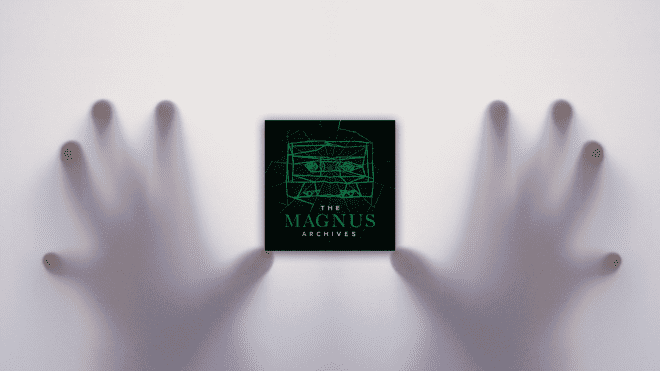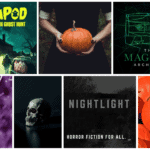How The Magnus Archives Helped Me Love Horror Again

(Editor’s note: This piece is best read on desktop, not mobile. This piece also discusses struggles with mental illness.)
The year is 2009. It’s a weeknight, maybe one or two in the morning, and I’m sitting at the family computer in my pajamas. The computer is just off the kitchen, which is just off all of the bedrooms in the house, so I’m sitting in the dark out of a worry that lights would wake my mom up.
(I am, technically, supposed to be asleep right now. Oops.)
I have maybe six or seven tabs open. There are several Wikipedia pages for different creatures in folklore and urban legend, which are always fun to read. But the thing that’s really holding my interest are these strange little websites I’ve found that collect horror stories and urban legends. They’re hosted on Angelfire or something similar, lovingly designed by some horror aficionado somewhere in the world. The background is black or dark brown, sometimes with patterns of bats or skulls; the buttons are shaped like tombstones or look like they’re dripping with blood.
I read about a hook-handed man murdering a young man walking to get help for his broken car.
A strange creature that looks like a human but contorted in ways that humans cannot, rushing through a cornfield towards a horrified college student.
A teenage girl whose house is broken into when her parents go out for the night.
I’m autistic with a special interest in horror, and I’m having the time of my life.
The year is 2014. I’ve dealt with hallucinations, paranoia, and delusions for as long as I can remember. As a child, when I lacked the words to fully describe what I was experiencing, my experiences were dismissed as insomnia, as anxiety. Nothing serious. Nothing anyone needs to help me with. I just need to stop bothering my parents so they can get a good night’s sleep. So for as long as I’ve been dealing with these issues, I deal with them on my own. I have my systems and they work for me. It’s fine. I’m fine.
Except it’s getting worse.
I have trouble being at home alone at night. I convinced my dad to get a pit bull so that I’d have someone at home with me when he’s away on business trips and my siblings are at our mom’s house, and having her helps, but not completely. I’m jumping at the voices of people passing outside, nearly crying at the sights of shadows that I’m convinced are moving. I try to find refuge in my favorite genres of media. But after watching a horror movie on Netflix leads to another week of sleepless nights, I come to a horrible conclusion:
Whatever is going on in my brain, horror is making it worse.
So I set horror aside. I try very hard to forget my old love, to pretend that I don’t miss it at all. I still have fantasy, still have sci-fi. I can read those. It’s fine. It’s fine.
The year is 2018. I talk to professionals about everything I’ve been experiencing and get a diagnosis, get medication, get coping techniques that make it manageable. I tell my therapist that I’m going to start trying to watch horror movies again, and I do try, but I get too freaked out by the visuals. I don’t want to prompt more issues, so I stay away from horror.
I am furious with myself for this decision. Horror has been one of my greatest loves since I was a small child; I have a distinct memory of being maybe seven or eight and telling my mom everything I had just read about the history of vampires. I’m angry at my brain—angry at myself, by extension—for not being able to handle horror anymore. The meds and therapy are helping me heal, but I still feel fundamentally broken.
The year is 2020. I’ve been slowly dipping my toes back into horror—reading an occasional short story here, a blog post there—but I haven’t fully dived back into it. Now, everyone I follow on Tumblr is talking about a horror podcast called The Magnus Archives. The Magnus Archives is a podcast made by creator Jonathan Sims about a man (also named Jonathan Sims, otherwise known as The Archivist) who discovers something sinister lurking beneath the polished academic facade of the paranormal research institute he works at. One night, as I’m relaxing in bed with my partner, I open Spotify and start playing the first episode.
Eerie string music plays, raising the hairs on my arms. A voice begins to speak.
“Rusty Quill presents: The Magnus Archives.”
The music is unsettling, setting me on edge in a familiar way that I’ve missed like a fish missing water.
“Episode One: Angler Fish.”
My heart is racing already—not from fear (yet) but from excitement.
“Test, test, test. One-two-three. Right. My name is Jonathan Sims. I work for the Magnus Institute, London: an organization dedicated to academic research into the esoteric and the paranormal.”
Read more: The Magnus Effect: how Tumblr contributed to the success of The Magnus Archives
The episode terrifies me. It unnerves and unsettles me in a way that I find, strangely, comforting and familiar. This first episode of The Magnus Archives features a monster (the eponymous Angler Fish) that dangles a humanoid lure in the shadow of a back alley and asks drunk passersby for a cigarette. When the hapless victim approaches and holds the cigarette out, the Angler Fish strikes.
That night, when the lights are off and I’m waiting for my meds to knock me out, that familiar paranoia comes creeping back in: my mind says, the Angler Fish is in your doorway. If you look up, it will be there, and it will kill you.
I tell my mind Shut the fuck up, I’m going to bed, and I fall asleep.
In the morning, I turn over the events of the previous night. I was scared, yeah, but I got past it. I realize that Magnus is exactly what I’ve been needing: it’s more immersive than written horror, but doesn’t freak me out the way that visual horror does. I eagerly devour the rest of the season.
In season two, The Archivist is—to put it gently—having a really fucking bad time. He’s discovered that his predecessor was murdered and her body left in the tunnels beneath the Magnus Institute (the reason for the title of The Magnus Archives), implying that her murder had something to do with her work. As The Archivist spirals down paranoia and delusions, I’m blindsided by how much I relate to him. I mean, I’ve never stalked my coworkers to their house, but the paranoia? Being convinced that someone wants to harm you? Knowing with total certainty that if you make one wrong move, someone will kill you? I’ve been there.
I feel really, really bad for The Archivist! He makes bad decisions and harms the people around him, for sure, and I’m not excusing that. But I understand where he’s coming from. I don’t know if the creator intended for him to be read this way or not, but I start to see myself in The Archivist: someone dealing with a mental illness that makes you predisposed to thinking that everyone is out to get you. For The Archivist, that’s greatly exacerbated because he has actual proof that somebody really is.
I come up with a lengthy headcanon for The Archivist, giving him my own backstory: delusions and paranoia from a young age, finally getting a diagnosis and meds as a young adult. I try viewing his actions in season two through the lens of someone who stops taking his meds, and suddenly everything clicks into place. I don’t excuse the harm he does to his coworkers, but I sympathize with him.
And that makes me realize something: if I can sympathize with The Archivist, why can’t I sympathize with myself? If I can give him my exact history and treat him gently, why can’t I treat myself gently, too?
Maybe The Archivist and I aren’t that dissimilar. Maybe we’re both just people trying to get through life even though our brains are against us. Maybe it’s not his fault that his brain makes things hard for him. Maybe it’s not my fault, either.
In 2009, I open a page on a horror story website and start reading a story about vampires.
In 2020, I start playing The Magnus Archives episode “MAG 56 Children of the Night” and listen to a vampire hunter talk about his life.
I love horror.
I am happy.
I am at peace.













Comments
Comments are closed.